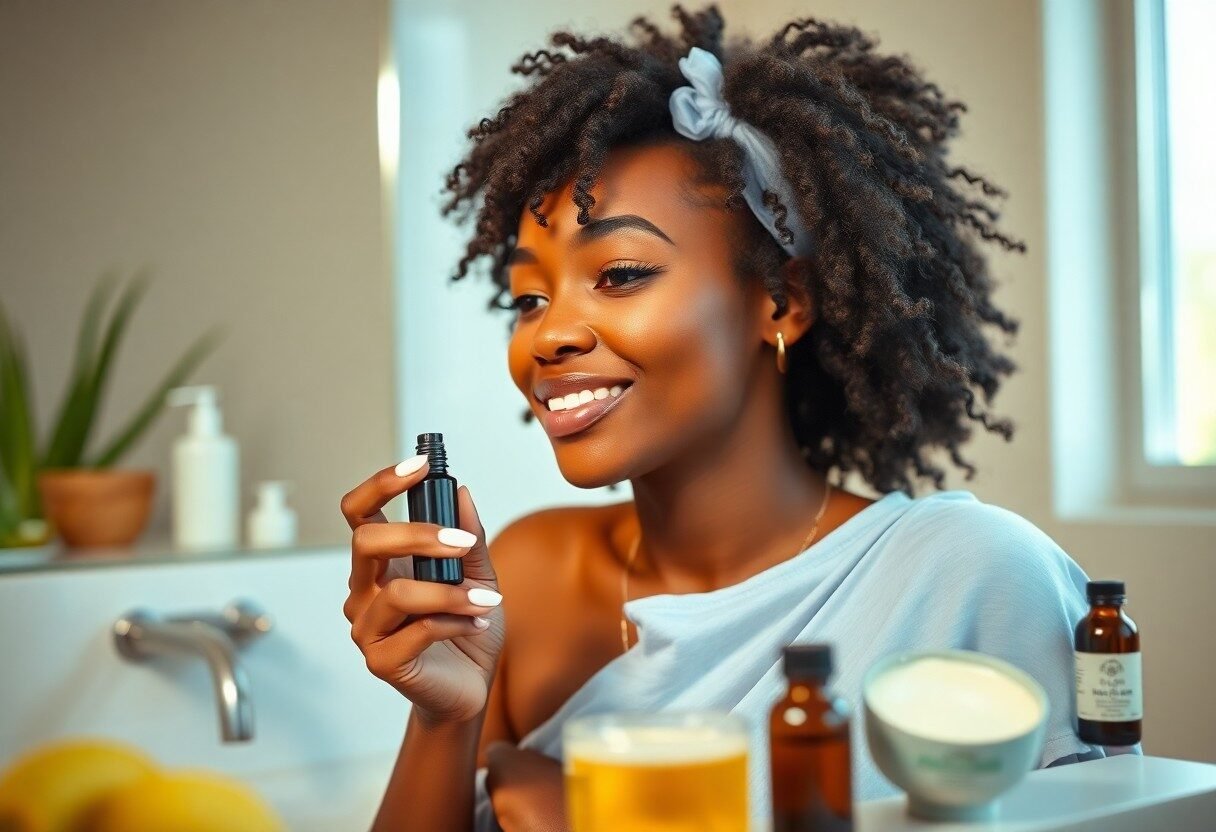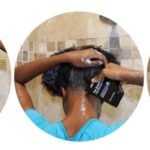
You may not realize that the health of your scalp plays a significant role in achieving optimal hair growth. I find that a well-cared-for scalp can prevent issues like dandruff and itchiness, which in turn creates a perfect environment for your hair to thrive. In this post, I will explore various techniques and products that can help you maintain a clean, hydrated, and balanced scalp, setting the stage for stronger, lusher hair. Your hair’s health starts at the roots, so let’s investigate the vitals of effective scalp care!
Key Takeaways:
- Regular cleansing is vital for removing dirt, oil, and product build-up that can hinder scalp health.
- Moisturizing the scalp can prevent dryness and flakiness, contributing to a healthier environment for hair growth.
- Utilizing scalp treatments or oils rich in vital nutrients can promote circulation and nourish hair follicles.
- A balanced diet rich in vitamins and minerals supports overall scalp health and encourages optimal hair growth.
- Avoiding excessive heat styling and chemical treatments helps maintain the integrity of both hair and scalp.
- Incorporating gentle massaging techniques can enhance blood flow to the scalp, aiding in relaxation and hair vitality.
- Being mindful of hair care products and opting for those without harsh chemicals can protect the scalp and hair.
The Biological Foundation of Scalp Health
The scalp’s health hinges on a complex interplay of cellular mechanisms, blood circulation, and the diverse microbiome residing on its surface. It comprises multiple layers, including the epidermis, dermis, and subcutaneous tissue, each with distinct functions. For instance, hair follicles are nestled within the dermis, fueled by a rich supply of blood vessels that nourish them. This biological network supports not only hair growth but also the overall condition of the scalp, influencing its ability to maintain balance and function effectively.
Anatomy of the Scalp: A Deeper Look
Understanding the anatomy of the scalp reveals how each layer contributes to hair health. The scalp is primarily composed of skin, including the outer epidermis that protects against environmental stressors, the dermis rich in collagen and elastin providing strength and elasticity, and the hypodermis, which contains fat cells that support overall structure. Additionally, the scalp houses numerous hair follicles, sebaceous glands, and sweat glands, all of which play vital roles in keeping your hair and scalp healthy.
The Role of Scalp Health in Hair Growth
Optimal scalp health directly influences hair growth processes. A healthy scalp environment promotes optimal functioning of hair follicles, reducing stressors that could lead to hair thinning or loss. Scalp irritation, inflammation, or an unbalanced microbiome can hinder hair growth and even trigger conditions like dandruff or seborrheic dermatitis. By prioritizing scalp care, you create a nourishing habitat that supports each hair’s growth cycle, leading to visibly fuller, healthier hair.
The correlation between a healthy scalp and robust hair growth is evident in various studies that show improved hair density in individuals who regularly engage in scalp care practices. For example, proper exfoliation can enhance blood flow, ensuring that hair follicles receive the necessary nutrients and oxygen needed for growth. Likewise, maintaining pH balance through appropriate cleansing can prevent conditions that might disrupt the hair growth cycle. This harmonized approach ultimately creates the ideal foundation for vibrant hair.
Common Scalp Issues Impacting Hair Growth
Several scalp issues can significantly hinder hair growth and overall hair health. Understanding these common conditions helps in addressing them effectively. Dandruff, psoriasis, seborrheic dermatitis, and even stress can all play a role in compromised scalp health. By identifying and treating these issues early, you can create an optimal environment for hair growth and maintenance.
Identifying Dandruff and Its Causes
Dandruff often presents as flakes on the scalp, which can be due to factors like dry skin, oily scalp, or a yeast-like fungus known as Malassezia. Identifying the underlying cause is important for treatment, as dandruff can lead to discomfort and might exacerbate hair thinning if left untreated.
The Effects of Scalp Conditions: Psoriasis and Seborrheic Dermatitis
Psoriasis and seborrheic dermatitis can lead to severe irritation and inflammation of the scalp, promoting hair loss. Both conditions create scaly patches that disrupt normal hair follicle function, preventing optimal hair growth.
In individuals with psoriasis, the immune system triggers excessive skin cell growth, resulting in thick, red patches covered with silvery scales. Seborrheic dermatitis, on the other hand, is characterized by greasy, yellowish flakes and redness, often aggravated by stress and hormonal fluctuations. When these conditions are present, the scalp becomes inflamed and sensitive, disrupting the natural hair growth cycle and leading to increased shedding. Managing these conditions promptly is vital to prevent long-term effects on your hair health.
Stress and Its Hidden Impact on Scalp Health
Stress is often an overlooked factor that can negatively influence scalp health. Heightened stress levels can lead to ailments such as telogen effluvium, where hair follicles prematurely enter the shedding phase. This condition can dramatically decrease your hair density over time.
When stress overwhelms the body, hormonal imbalances may occur, leading to increased production of certain hormones like cortisol, which can adversely affect hair growth. Additionally, stress can exacerbate conditions like dandruff and psoriasis, creating a vicious cycle that further hampers your scalp’s health. Consider incorporating stress reduction techniques—such as meditation, exercise, or hobbies—as part of your routine to promote a healthier scalp and, ultimately, healthier hair.
Essential Practices for Scalp Care
Incorporating basic yet effective practices into your routine can greatly enhance scalp health. Regularly exfoliating the scalp can remove dead skin cells and build-up, promoting better hair growth. I recommend focusing on choosing the right hair products, adopting optimal washing techniques, and embracing natural remedies designed to nourish your scalp. Each aspect contributes uniquely to creating a balanced environment for your hair to thrive.
Choosing the Right Hair Products
Selecting hair products that suit your specific scalp type is fundamental. Look for formulations that are free from sulfates, alcohols, and parabens, as these can strip the scalp of its natural oils and cause irritation. You might consider products infused with natural ingredients like tea tree oil or aloe vera, known for their soothing properties.
Optimal Washing Techniques for a Healthy Scalp
Don’t underestimate the power of washing your hair correctly; it can make all the difference. Gently massage your scalp with your fingertips—never your nails—while cleansing, using lukewarm water to avoid stripping away necessary oils. This not only helps to remove dirt and excess sebum but also stimulates blood circulation, fostering a healthier environment for hair growth.
In practice, I usually recommend washing your hair about two to three times a week, depending on your scalp type and lifestyle. For those with oily scalps, a clarifying shampoo might be beneficial occasionally to remove product buildup. Make sure to rinse thoroughly, as residue can lead to an unhealthy scalp. You might also try using scalp scrubs every few weeks for an extra boost of exfoliation, which will further enhance your scalp’s health.
Natural Remedies for Scalp Nourishment
To apply natural remedies effectively, consider making a simple coconut oil mask by warming it slightly and massaging it into your scalp. Leave it on for a minimum of 30 minutes before washing out. Similarly, you can mix equal parts of apple cider vinegar and water; applying it post-wash can work wonders in closing hair cuticles, making your hair shinier and easier to manage. These all-natural treatments not only help with scalp health but can also promote stronger, healthier hair over time.
The Connection Between Diet and Scalp Health
A well-nourished scalp directly impacts hair growth and overall hair health. Nutrient deficiencies can lead to dryness, thinning strands, and increased hair loss. With an adequate intake of vitamins and minerals, I’ve noticed my scalp maintain a balanced environment conducive to optimal hair development. Incorporating specific nutrients into your diet not only promotes scalp vitality but also enhances your hair’s strength and sheen, making it necessary to prioritize this aspect of your well-being.
Key Nutrients for Hair and Scalp Vitality
Several key nutrients play a pivotal role in nurturing your scalp and fostering robust hair growth. Biotin, a B vitamin, stands out as a hair health champion, stimulating keratin production. Omega-3 fatty acids, found in fish and seeds, contribute to scalp hydration and enhance blood circulation. Additionally, zinc supports hair tissue growth and repair, while vitamins A and E help regulate oil production and protect the scalp from damage.
Foods to Incorporate for Enhanced Hair Growth
Incorporating specific foods into your diet can significantly bolster your efforts for enhanced hair growth. Fatty fish like salmon, nuts, seeds, eggs, spinach, and sweet potatoes are all fantastic additions. These foods are packed with the vital nutrients your scalp needs to thrive, ensuring that your hair receives the nourishment it deserves.
To optimize hair health, I find that adding fatty fish such as salmon or mackerel to my weekly meals is incredibly effective. These fish are rich in omega-3 fatty acids and protein, two elements critical for scalp health. I also make sure to include a handful of almonds or walnuts for their vitamin E and zinc content. Pairing these healthy fats with leafy greens like spinach provides iron and vitamins A and C, enhancing blood circulation to the scalp and ensuring that my hair follicles receive a steady supply of nutrients. By prioritizing these foods, I’ve noticed a tangible improvement in my hair’s strength and shine.
When to Seek Professional Help
Certain conditions may arise that require expertise beyond home remedies and general care practices. Seeking professional assistance is wise when you experience persistent symptoms such as intense itching, significant hair loss, or visible scalp conditions such as redness and flakiness that do not improve with basic treatments. In such cases, a specialized evaluation can provide insights and targeted interventions for optimal scalp health.
Signs Indicating Professional Intervention
Look for warning signs that signal the need for professional help. These include extreme itching that disrupts daily activities, increased hair shedding that may indicate an underlying condition, or the presence of scalp lesions that could signify infection. If your scalp feels uncomfortable, painful, or exhibits changes in color and texture, consulting a professional is advisable to address these concerns effectively.
Understanding Treatment Options: From Dermatology to Trichology
Various treatment options are available depending on the specific scalp condition you are facing. Dermatologists specialize in skin and can diagnose conditions such as psoriasis or eczema, while trichologists focus on hair and scalp health. Your treatment plan may include medications, topical treatments, or specialized therapies aimed at restoring balance and encouraging regrowth. It’s important to know the approach each professional takes to ensure you receive the best care possible.
In my experience, both dermatologists and trichologists bring valuable expertise to scalp health. Dermatologists may prescribe corticosteroids or antifungal treatments for conditions like seborrheic dermatitis or scalp psoriasis, while trichologists often offer holistic approaches, such as tailored shampoo regimens or scalp massages. Choosing the right professional based on your symptoms can significantly influence your recovery and hair growth journey, ultimately leading to a healthier scalp.
Summing up
Summing up, maintaining a healthy scalp is vital for optimal hair growth, and I encourage you to prioritize your scalp care routine. By keeping your scalp clean, hydrated, and nourished, you can create an ideal environment for hair follicles to thrive. Incorporating gentle cleansing, natural oils, and regular exfoliation can transform not only your scalp health but also your hair quality. Embrace these practices in your daily life to achieve the vibrant, luscious hair you desire.
FAQ
Q: Why is scalp care important for hair growth?
A: Scalp care is necessary for hair growth because a healthy scalp provides the ideal environment for hair follicles to thrive. When the scalp is well-maintained, it helps minimize issues such as oiliness, dryness, or dandruff, which can inhibit hair growth. Additionally, a clean and nourished scalp can improve blood circulation, delivering necessary nutrients to the hair roots and promoting stronger hair growth.
Q: How often should I wash my hair for optimal scalp health?
A: The frequency of washing your hair can depend on your hair type, lifestyle, and scalp condition. Generally, those with oily scalps may need to wash their hair every day or every other day, whereas individuals with dry scalps might find that washing 2-3 times a week is sufficient. It’s important to use a gentle, sulfate-free shampoo to avoid stripping your scalp of natural oils.
Q: What ingredients should I look for in scalp care products?
A: When choosing scalp care products, look for ingredients that hydrate, nourish, and soothe the scalp. Some beneficial ingredients include tea tree oil (for its antimicrobial properties), jojoba oil (to moisturize without clogging pores), and aloe vera (to calm irritation). Exfoliating ingredients like salicylic acid can help remove buildup, while peptides and necessary vitamins can support scalp health and encourage hair growth.
Q: Can stress affect the health of my scalp?
A: Yes, stress can significantly impact scalp health. High levels of stress can lead to hair loss and exacerbate scalp conditions such as dandruff or dermatitis. Stress can trigger hormonal changes that disrupt the hair growth cycle, leading to thinning or shedding hair. Engaging in stress-reduction techniques such as exercise, meditation, or proper sleep can help maintain a healthier scalp.
Q: How can I treat dandruff or an itchy scalp?
A: To manage dandruff or an itchy scalp, consider incorporating a medicated shampoo containing active ingredients like ketoconazole, zinc pyrithione, or selenium sulfide. It’s important to follow the instructions on these products. Additionally, incorporating necessary oils such as tea tree or lavender can soothe irritation. Maintaining a balanced diet rich in antioxidants and omega fatty acids may also help improve overall scalp health.
Q: Is scalp massage beneficial for hair growth?
A: Yes, scalp massage can be beneficial for hair growth. Massaging the scalp increases blood flow to the hair follicles, delivering more nutrients and oxygen. It can also promote relaxation and reduce stress, further supporting hair health. Using oils during the massage can enhance moisture and nourishment levels. Aim for a gentle, circular motion for about 5-10 minutes several times a week.
Q: Can diet impact the health of my scalp and hair growth?
A: Absolutely, diet plays a significant role in scalp and hair health. Consuming a balanced diet rich in vitamins A, C, D, E, biotin, and minerals like zinc and iron can support hair growth. Foods such as leafy greens, nuts, seeds, fatty fish, and lean proteins can provide the nutrients necessary for a healthy scalp and stronger hair. Staying hydrated is also key in maintaining overall scalp health.











